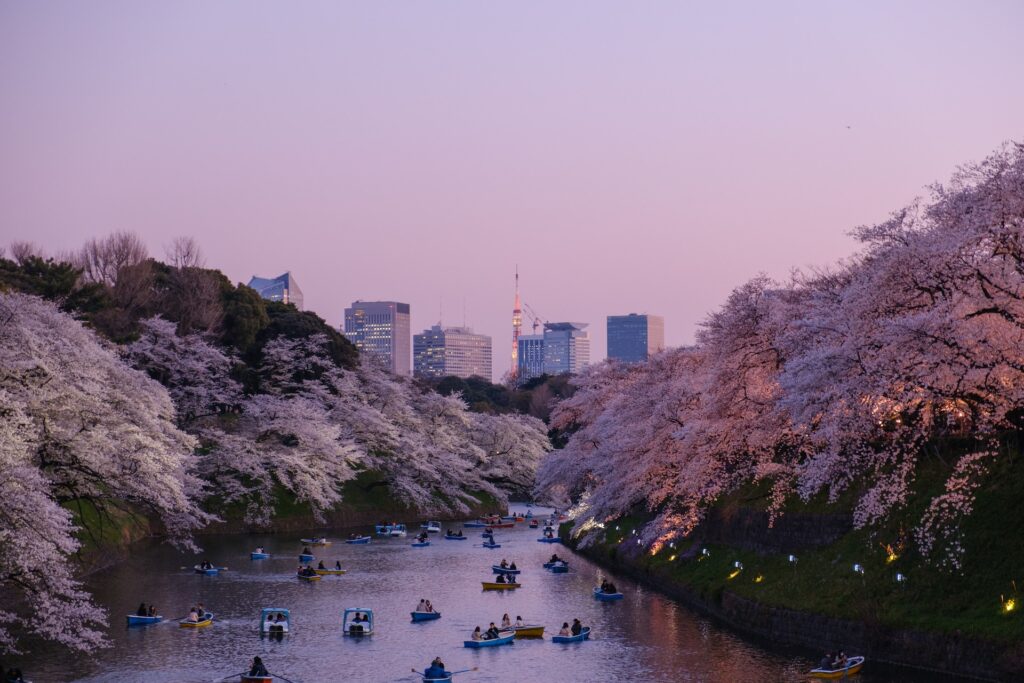Japan
Japan (Japanese: 日本, Nippon or Nihon, and formally 日本国, Nihonkoku) is an island country in East Asia. It is situated in the northwest Pacific Ocean and is bordered on the west by the Sea of Japan, extending from the Sea of Okhotsk in the north toward the East China Sea, Philippine Sea, and Taiwan in the south. Japan is a part of the Ring of Fire, and spans an archipelago of 14,125 islands, with the five main islands being Hokkaido, Honshu (the “mainland”), Shikoku, Kyushu, and Okinawa. Tokyo is the nation’s capital and largest city, followed by Yokohama, Osaka, Nagoya, Sapporo, Fukuoka, Kobe, and Kyoto.
Japan is the eleventh most populous country in the world, as well as one of the most densely populated. About three-fourths of the country’s terrain is mountainous, concentrating its highly urbanized population on narrow coastal plains. Japan is divided into 47 administrative prefectures and eight traditional regions. The Greater Tokyo Area is the most populous metropolitan area in the world.
Japan is considered a cultural superpower as the culture of Japan is well known around the world, including its art, cuisine, film, music, and popular culture, which encompasses prominent manga, anime and video game industries
Cultural Tours
Cultural tours offer a rich and immersive experience into the heritage and traditions of a particular region or country. These tours can include visits to historical landmarks, museums, galleries, and other cultural institutions, as well as interactions with local people and participation in traditional activities and ceremonies. Cultural tours provide an opportunity to gain a deep understanding and appreciation of a culture’s art, music, literature, cuisine, and customs. They can also broaden one’s perspective and deepen one’s understanding of the world by exposing travelers to different ways of life and ways of thinking.
One of the most significant benefits of cultural tours is the opportunity to learn about and appreciate cultural diversity. By experiencing different cultures firsthand, travelers can develop a greater understanding and empathy for people from different backgrounds. Cultural tours can also promote cultural exchange, as they provide an opportunity for travelers to engage with local people and learn about their way of life. By fostering cultural understanding and respect, cultural tours can contribute to a more peaceful and interconnected world. Additionally, cultural tours can be a great way to support local communities and economies by spending money on local businesses and supporting cultural preservation efforts.




- Jan
- Feb
- Mar
- Apr
- May
- Jun
- Jul
- Aug
- Sep
- Oct
- Nov
- Dec
Cycling
Cycling is a popular activity that offers numerous physical and mental health benefits. It is a low-impact form of exercise that can improve cardiovascular health, increase strength and endurance, and promote weight loss and management. Cycling is also a great way to reduce stress and improve mental well-being, as it provides an opportunity to enjoy the outdoors and connect with nature. Furthermore, cycling is an environmentally friendly mode of transportation that can help reduce carbon emissions and save money on transportation costs.
Cycling is a versatile activity that can be enjoyed by people of all ages and fitness levels. From leisurely rides on scenic routes to intense competition on challenging terrains, cycling provides a range of options for people looking to engage in physical activity. Additionally, cycling can be a social activity, as it provides an opportunity to connect with other cycling enthusiasts and participate in group rides and events. With its many benefits and the ability to enjoy the outdoors, cycling is an excellent activity for anyone looking to improve their physical and mental well-being while exploring the world around them.




- Jan
- Feb
- Mar
- Apr
- May
- Jun
- Jul
- Aug
- Sep
- Oct
- Nov
- Dec
Kayaking
Kayaking is a popular water sport that involves paddling a small boat, known as a kayak, on rivers, lakes, and other bodies of water. It is a fun and exhilarating activity that provides an opportunity to explore natural environments and experience the outdoors in a unique way. Kayaking offers numerous physical and mental health benefits, such as improved cardiovascular health, increased strength and endurance, and reduced stress and anxiety.
Kayaking can be enjoyed by people of all ages and fitness levels, as it offers a range of difficulty levels and water conditions. From peaceful paddles on calm lakes to thrilling rapids on fast-moving rivers, kayaking provides a range of options for people looking to engage in physical activity. Additionally, kayaking can be a social activity, providing an opportunity to paddle with friends and family or participate in group tours and events. With its many benefits and the ability to explore and appreciate natural environments, kayaking is an excellent activity for anyone looking to improve their physical and mental well-being while enjoying the beauty of the great outdoors.




- Jan
- Feb
- Mar
- Apr
- May
- Jun
- Jul
- Aug
- Sep
- Oct
- Nov
- Dec
